
In 2024, Top-Notch Solutions for Disabled Apple ID From Apple iPhone 15 Making It Possible

Top-Notch Solutions for Disabled Apple ID On Apple iPhone 15: Making It Possible
The Apple ID serves as the cornerstone of an iOS user’s digital identity. It grants access to a multitude of essential services and applications. This unique identifier is crucial for accessing the App Store, iTunes, iCloud, and other Apple services. However, the security of this pivotal account is paramount. Any security breaches or suspicious activities can prompt Apple ID to be disabled.
To avoid the potential consequences of a disabled Apple ID, it is imperative to explore effective solutions. This guide seeks to furnish users with a range of excellent strategies to address the issue at hand. So, if you are wondering why is my Apple ID disabled, continue to read the article.
Part 1. Discussing the Reasons for Apple ID Getting Disabled
Wondering why your Apple ID has been disabled? Experiencing intense frustration is not uncommon in this scenario. Nonetheless, understanding the potential triggers behind this issue is crucial. For Apple users, learning the factors leading to the Apple ID disabled problem is essential. The following are some typical reasons that can account for this predicament:
1. Security Questions
Failing to answer security questions accurately during the account recovery process can trigger Apple’s security protocols. It can lead to the temporary or permanent disabling of the Apple ID. Inaccurate or forgotten responses to these critical security measures can raise red flags. This eventually results in restricted access to the account.
2. Unauthorized Access Attempts
Apple’s strict security measures are designed to identify and prevent unauthorized access attempts. If the system detects unusual login activities or repeated failed login attempts, it may automatically disable the ID. Moreover, it is done to protect the user’s personal information and sensitive data.
3. Suspicious Account Activities
Any suspicious activities associated with the Apple ID can prompt Apple’s security algorithms to disable the ID. These include unusual purchase patterns, unauthorized transactions, or reports of account misuse. Furthermore, it usually results in temporary disabling as a precautionary measure.
4. Breach of Terms of Service
Not adhering to Apple’s terms and conditions may result in the prompt Apple ID being disabled. Examples include engaging in fraudulent activities or using unauthorized software or tools. In addition, manipulating Apple’s services or violating the company’s usage policies can also cause disablement. It is often accompanied by a permanent suspension from Apple’s ecosystem.
5. Unresolved Billing Issues
Unresolved billing disputes or outstanding payment issues can trigger the disabled problem. Moreover, declined transactions linked to the Apple ID can also be a cause. It restricts the user’s access to various Apple services until the payment concerns are rectified.
Part 2. Reset the Password: Solve Apple ID Disabled Issues
With Apple ID disabled, one of its primary solutions involves resetting the password. Fortunately, this can be achieved directly from an iOS device or a Mac. Users are offered convenient choices to regain authority over their accounts quickly. Here, you’ll find detailed, sequential instructions for each approach:
Resetting Password From iOS Device
- Step 1: To access the Settings app on your iOS device, locate and open the application with the “Gear” icon. Once inside, select your name and proceed to the subsequent screen, where you should tap “Sign-In & Security.”
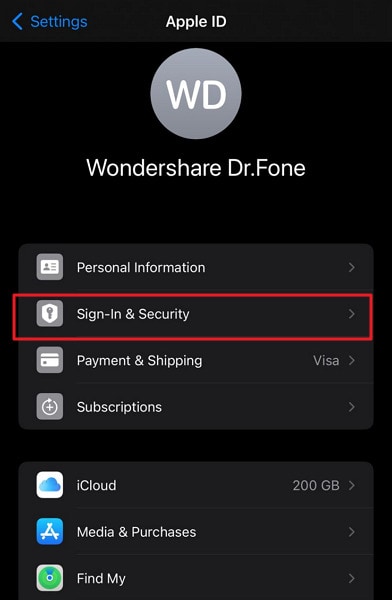
- Step 2: Now, tap the “Change Password” option and follow it by entering your iOS device passcode. Then, enter and confirm the new password and press “Change Password” to finalize it.
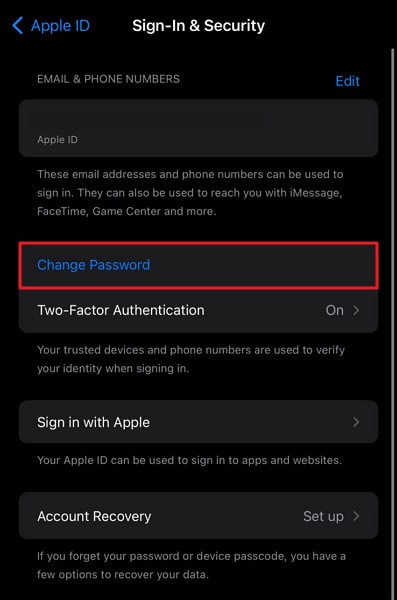
Resetting Password From Mac
- Step 1: On your MacBook, navigate to the “Apple” menu from the top left side and choose the “System Settings” option. Next, tap on your name and press “Sign-In & Security” on the following screen.
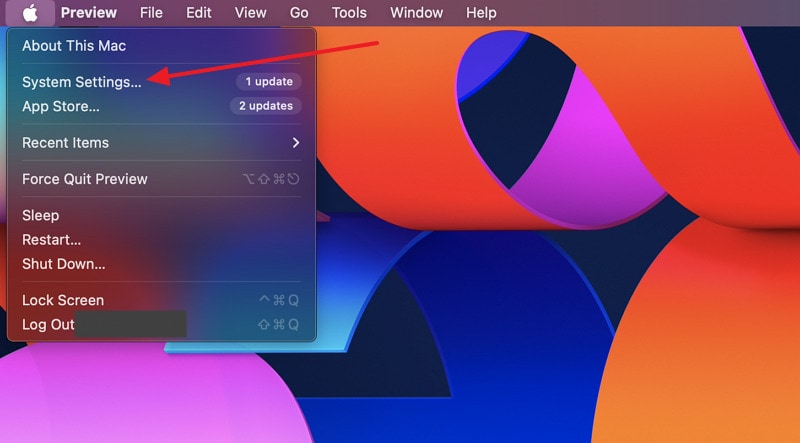
- Step 2: Move to the “Password” option and click “Change Password.” Now, follow the on-screen prompts to complete the password resetting process by providing your MacBook passcode.
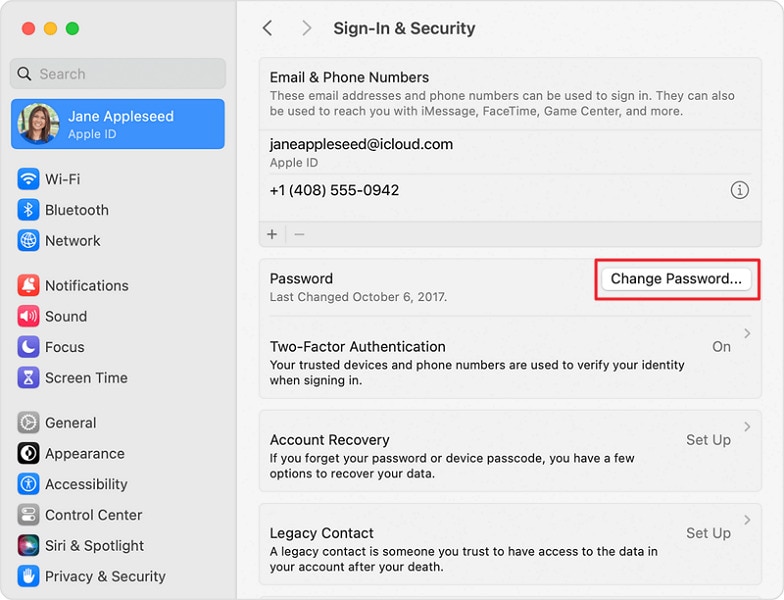
Part 3. Use Apple Support App: Solve Apple ID Disabled Issues
If you lack access to a dependable device for resetting your password, there’s no cause for concern. Apple provides to reset your Apple ID password using an alternative device. This can be accomplished through the official Apple Support app. The following procedures offer a thorough walkthrough:
- Step 1: On a device you’ve borrowed, download the official Apple Support app and launch it. Scroll down within the app to “Support Tools” and select “Reset Password.”
Image name: fix-apple-id-disabled-5.jpg
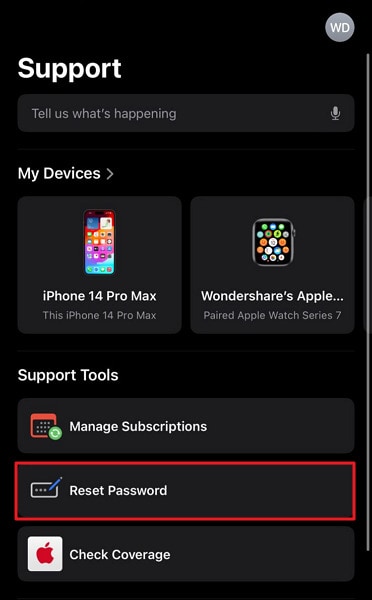
- Step 2: Following this, choose “Help Someone Else,” input your Apple ID, and tap “Continue.” Follow the on-screen prompts to complete the password reset process.
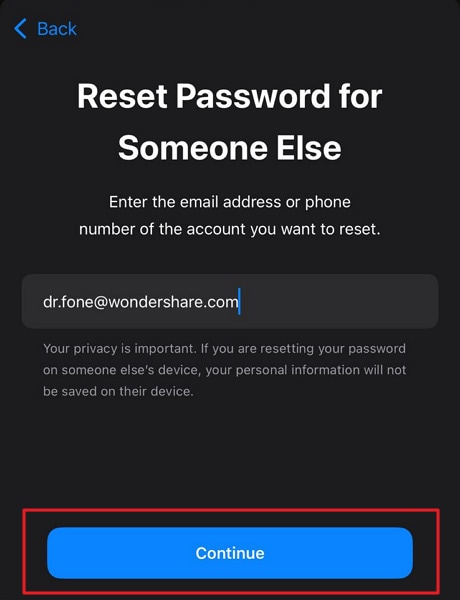
Part 4. Using iForgot Website: Solve Apple ID Disabled Issues
In instances where conventional methods fail, using the iForgot website can offer an alternative route. The platform provides an extensive range of tools and resources. It is tailored to aid users in the process of resetting their Apple ID credentials. Follow these step-by-step instructions to use the iForgot website effectively to fix the “Why is My Apple ID Disabled” problem:
- Step 1: Launch a web browser, visit iforgot.apple.com, and select the “Reset Password” option. It will give you access to the Apple ID password reset page. Here, provide your Apple ID, usually your email address linked to your Apple account, and proceed by clicking “Continue.”
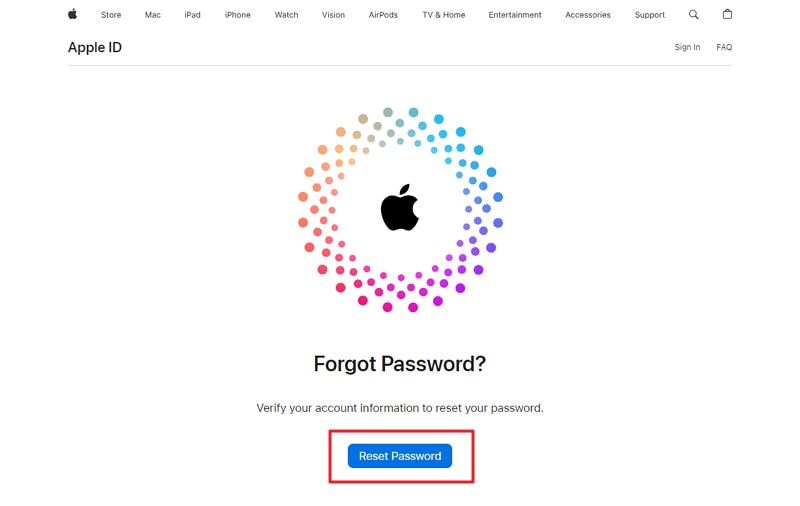
- Step 2: On the next screen, Apple will inform you that they have sent a confirmation message to your trusted devices for resetting the password. Tap “Allow” on one of your trusted devices and provide your iDevice passcode to reset the Apple ID password.
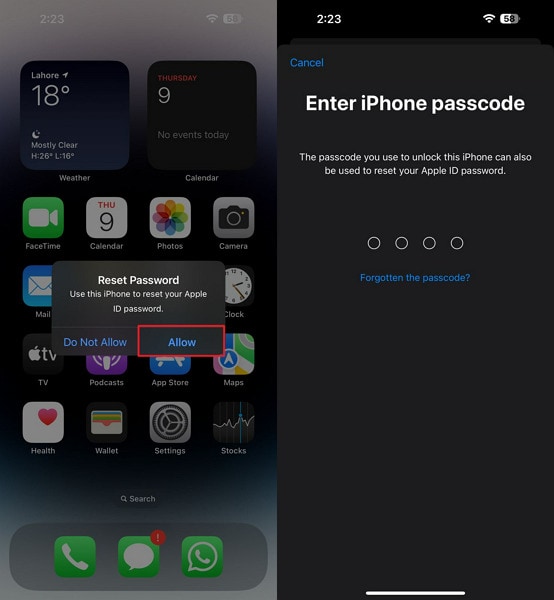
Part 5. Wondershare Dr.Fone - Screen Unlock (iOS): A Comprehensive Solution To Solve Apple ID Disabled Issues
No need to worry if you’re experiencing difficulties accessing iCloud and other Apple services due to a forgotten Apple ID password. Wondershare Dr.Fone can bypass the Apple ID lock completely. This tool allows users to regain access to their iCloud services and other Apple ID features. Otherwise, your Apple ID would lose its functionality within your iOS devices.
Furthermore, this capability of Wondershare Dr.Fone remains effective even if the Find My iPhone feature is activated on the Apple iPhone 15 device. This tool can also bypass the Screen Time Passcode if you have forgotten your password. By utilizing this feature, you will be able to resolve your disabled Apple ID issue.
Dr.Fone - Screen Unlock (iOS)
Unlock iPhone/iPad Lock Screen Without Hassle.
- Simple, click-through, process.
- Unlock screen passwords from all iPhone and iPad.
- No tech knowledge required, everybody can handle it.
- Supports the latest iOS version fully!

4,395,217 people have downloaded it
Key Features of Wondershare Dr.Fone
- Wondershare Dr.Fone allows users to unlock their iDevices screen, which enables them to regain access to their devices.
- You can also use this robust iPhone unlock tool to remove the SIM carrier lock to use your device internationally.
- This iDevice screen unlock software provides multiple tools like data eraser, data recovery, phone transfer, WhatsApp transfer, system repair, etc.
Instructions Involved To Solve Apple ID Disabled Issues via Wondershare Dr.Fone
Wondershare Dr.Fone is specially designed for users with various technical experiences. It presents an easy-to-follow guide with its user-friendly interface to assist its users in every way possible. Here is how to Solve Apple ID disabled issues via Wondershare Dr.Fone - Screen Unlock (iOS):
- Step 1. Access the Robust Screen Unlock Tool
You will have to start by opening Wondershare Dr.Fone on your system and accessing the “Toolbox” section present in the left panel. Then, continue with the “Screen Unlock” feature and select the “iOS” device. Proceed with the “Remove Apple ID” option among different options from the next window.
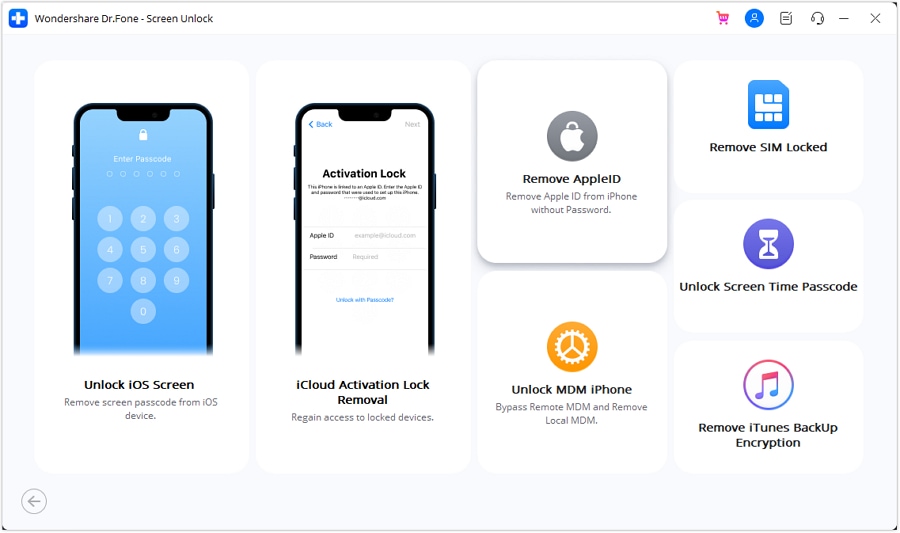
- Step 2. Begin Unlocking the Apple ID
After connecting your iDevice to the system, you need to move forward with the “Unlock Now” button. Before moving forward, it’s essential to ensure you have Screen Lock and Two-Factor Authentication enabled on your Apple iPhone 15. After that confirmation, carry on with the on-screen instructions.
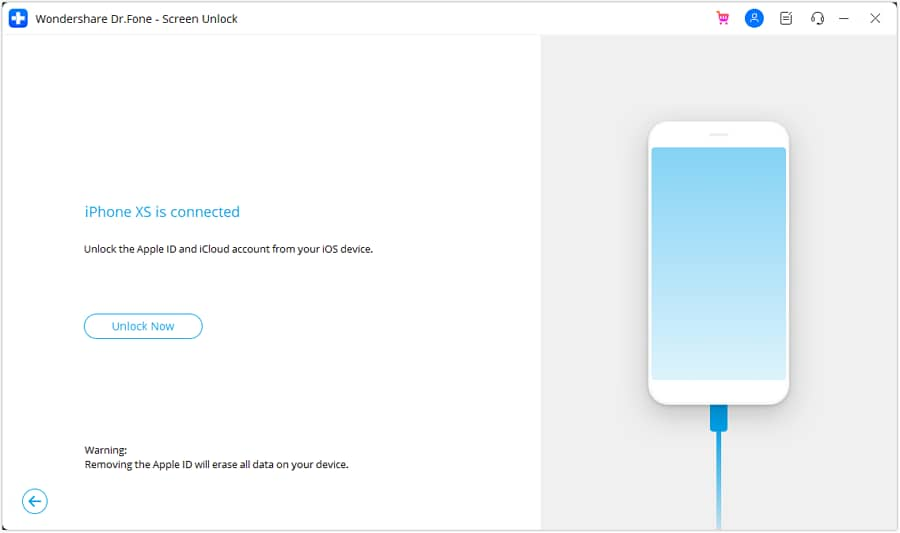
- Step 3. Put iPhone in the Recovery Mode and Recognize the Model
You need to put your Apple iPhone 15 in Recovery Mode by following the on-screen instructions to initiate the Apple ID unlocking process. The software will recognize the “Device Model” in a self-controlling way. After that, you will have to go ahead with the “System Version” selection and hit the “Start” button.
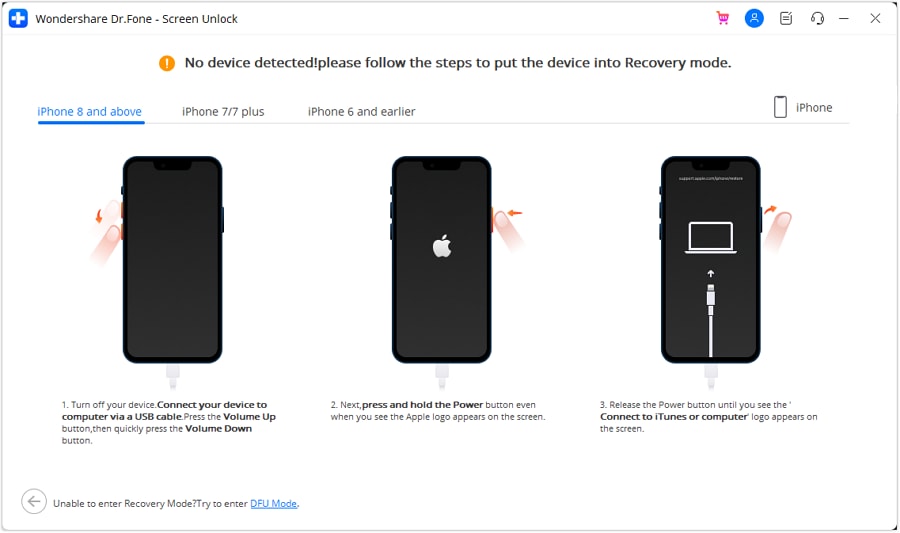
- Step 4. Download the Firmware and Provide Confirmation
The relevant firmware will start downloading, and you will have to proceed with the “Unlock Now” button after the downloading. You will have to enter a code for confirmation, and after that, you can view the removal progress. Move forward by hitting the “Done” button if the Apple ID gets unlocked.
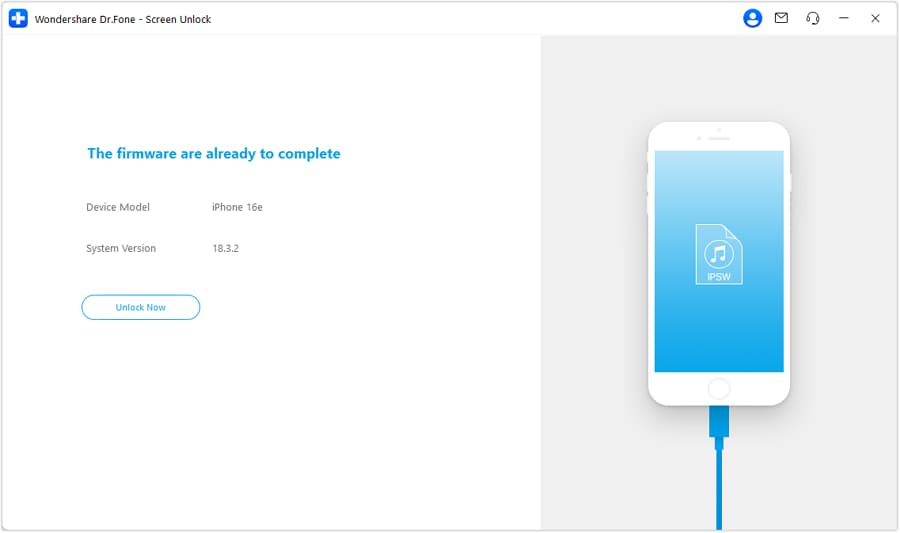
Conclusion
In conclusion, this article aims to address the critical issue of Apple ID disabled. It can significantly disrupt the smooth operation of iOS devices. We have offered a thorough examination of the different elements that may result in the deactivation of an Apple ID. Moreover, we have introduced several effective measures to assist you in addressing this matter. It allows you to regain access to your Apple ID.
Furthermore, the article has highlighted the comprehensive capabilities of Wondershare Dr.Fone. It is for users encountering persistent challenges in resolving their disabled Apple ID. Moreover, Dr.Fone is a robust and reliable solution that can offer a more in-depth remedy to the problem.
Troubleshooting ‘Error Connecting to the Apple ID Server’ On Apple iPhone 15
Experiencing an “error connecting to the Apple ID server“ can be a frustrating roadblock for users. Apple owners often face this issue, hindering seamless access to their Apple ID. Fear not; the guide unveils 11 practical solutions to troubleshoot the problem.
The article has everything from verifying your network connection to ensuring the accuracy of your Apple ID credentials. Don’t let the Apple ID verification failed dilemma linger. Explore the page below and navigate through these troubleshooting steps for a seamless connection to the server.
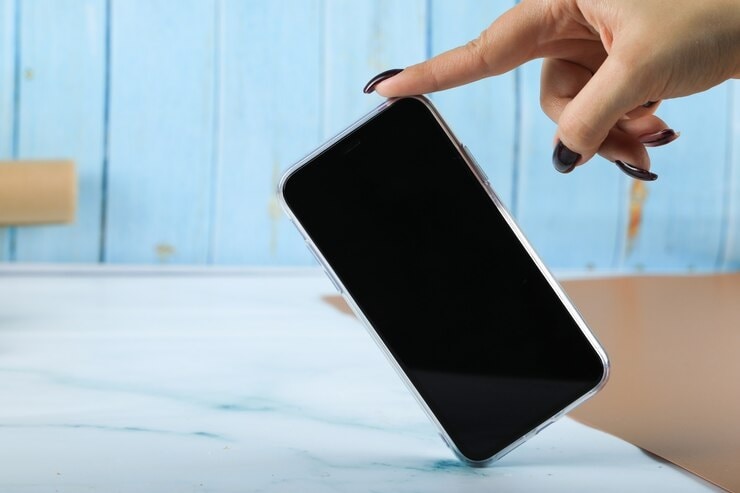
Part 1: What Causes the “Error Connecting to the Apple ID Server” Problem?
Below are the potential culprits if an error is connected to the Apple ID server. Understanding these causes is pivotal for effective troubleshooting.
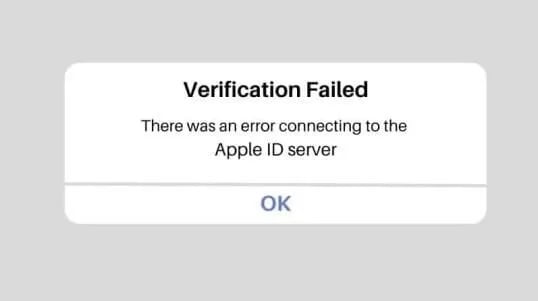
Temporary Problems With Apple Servers
Periodic disruptions in Apple servers can lead to the “Apple ID verification failed“ issue. These may occur due to routine maintenance or unexpected server outages.
The Internet Connection Is Not Working
The problem may also stem from a disrupted internet connection. You should investigate your Wi-Fi or cellular data to ensure a stable connection. Restarting routers or switching to an alternative network can also help.
Problems With Apple ID
Authentication issues can arise if users input incorrect Apple ID credentials or if their accounts face security concerns. Verifying and correcting these details or resetting the Apple ID password is crucial.
Incorrect Date and Time Settings
The device’s date and time settings must be accurate to establish a secure connection with the Apple ID server. You should check and adjust these settings, enabling automatic updates for synchronization.
Part 2: [10 Quick Solutions] There Was an Error Connecting to the Apple ID Server
The section below provides user-friendly fixes tailored to ease frustration and restore seamless connectivity.
Check Apple’s Servers
The initial step is to investigate the status of Apple’s servers. Server outages or scheduled maintenance can be the culprits behind the connectivity hiccup. Head to Apple’s service status page for real-time updates on server conditions.
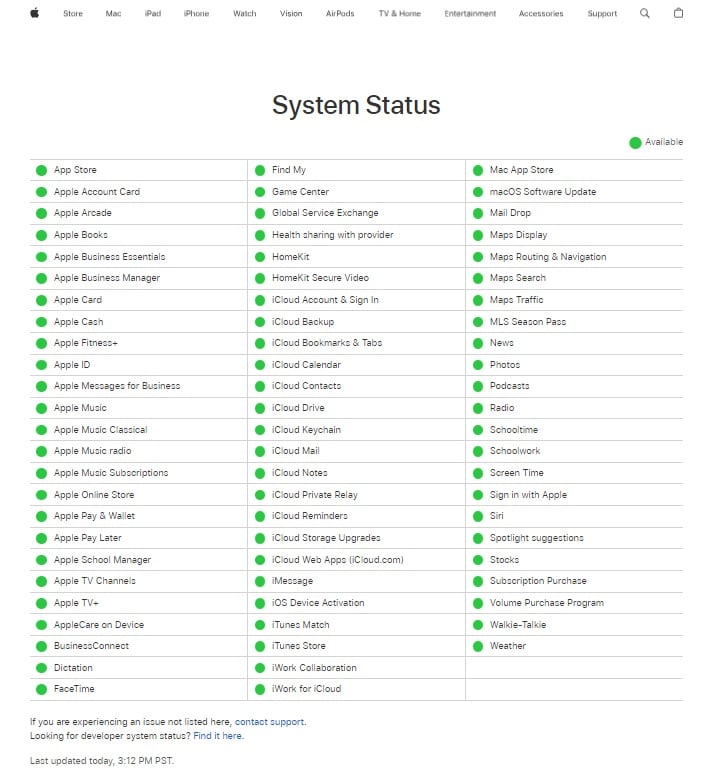
Check Your Network Connection
A fundamental yet crucial solution is to examine your network connection. Instabilities in Wi-Fi or cellular data can impede communication with Apple’s servers. Ensure a stable connection and troubleshoot any disruptions, considering a switch to an alternative network. You can follow this guide to check your network signal.
Set Up Another Admin User Account (for macOS Users)
Creating a new admin user account can serve as a strategic move for macOS users. Here’s how. It helps isolate issues tied to a specific user account. It provides insights into whether the problem is user-specific. Here’s how.
- Step 1: Open System Preferences on your Mac and choose Users & Groups.
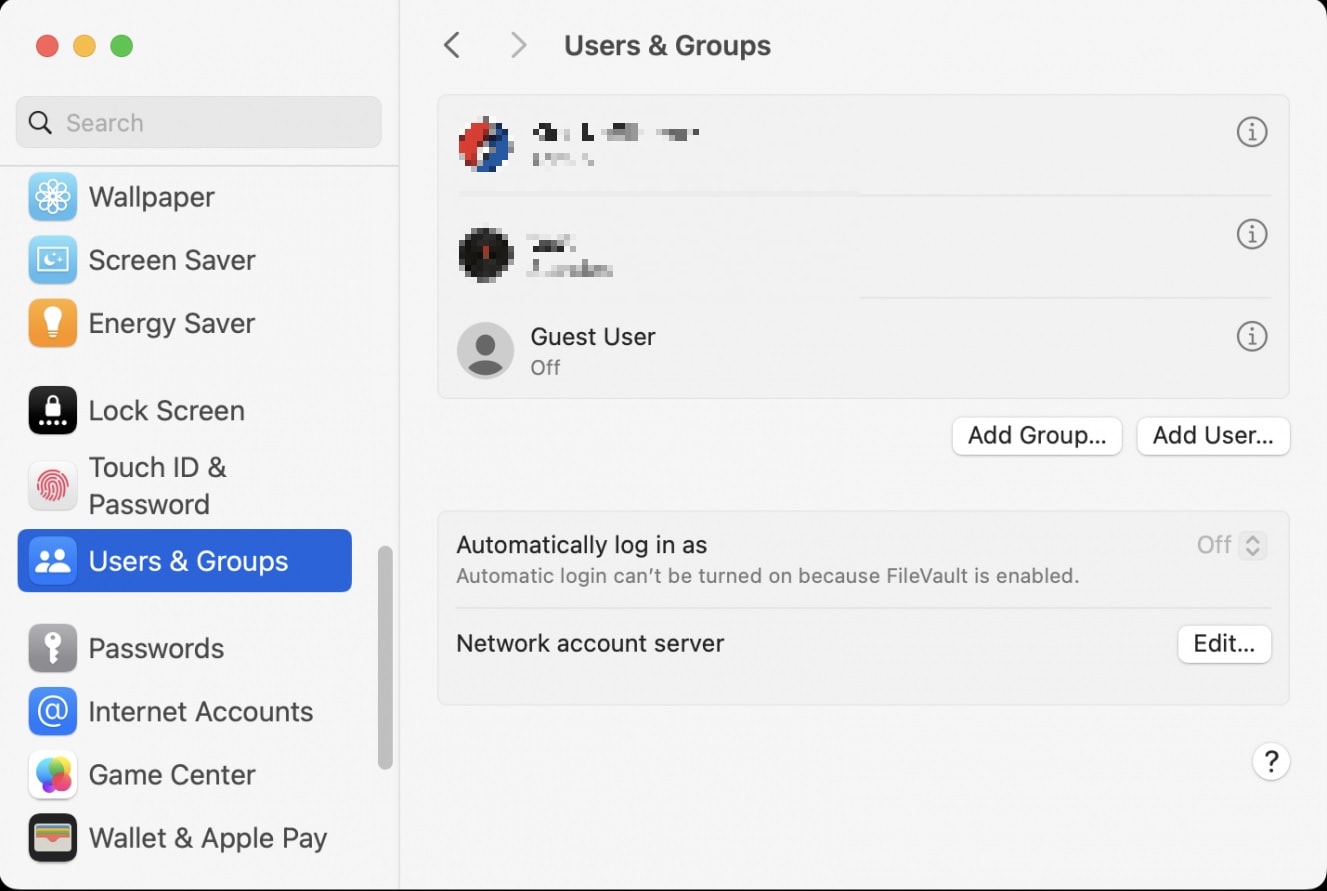
- Step 2: Click the lock icon and enter your admin password. Click the + or Add User… button to add a new user, selecting Administrator as the account type. Log in to the new account and check if the issue persists.
Update Your iOS or macOS Software
Outdated operating systems often contribute to connectivity issues. Ensure your iOS or macOS software is up to date by checking for available updates. Here’s how.
- For iOS: Go to Settings, tap General, and select SoftwareUpdate.
- For macOS: Open SystemPreferences, click on Software Update.
Download and install any available updates.
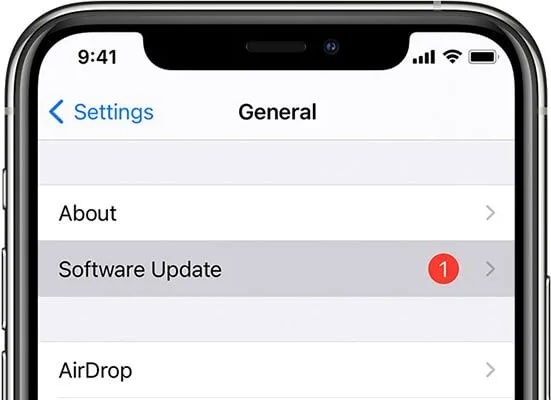
Boot macOS in Safe Mode
Booting your Mac in Safe Mode is another approach to troubleshooting. The mode disables unnecessary processes, allowing you to identify and resolve potential conflicts causing the connection error. To put your Mac into safe mode, restart it and hold down the Shift key. Release it when the Apple logo appears.
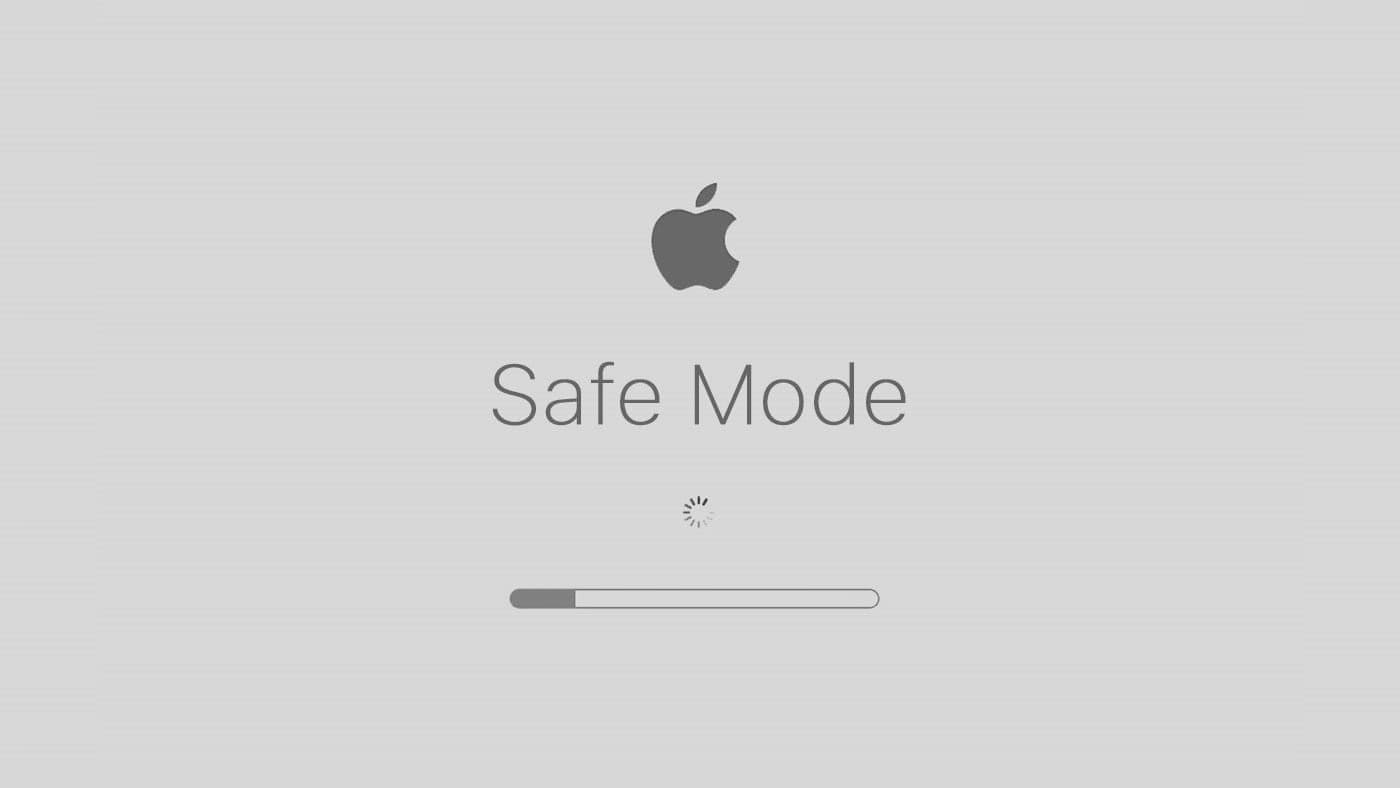
Restart Your Apple Device
A classic yet effective solution is to restart your Apple device. This simple action refreshes system processes and can resolve various connectivity issues. Power off your device and turn it back on to initiate a clean start.
Sign Out and Sign Back Into Your Apple ID Account
Temporarily signing out of your Apple ID account and then signing back in can be a virtual reset. The process refreshes the connection and addresses potential authentication issues, resolving the error.
- On iOS: Go to Settings, tap your Apple ID, and choose SignOut. Sign in again.
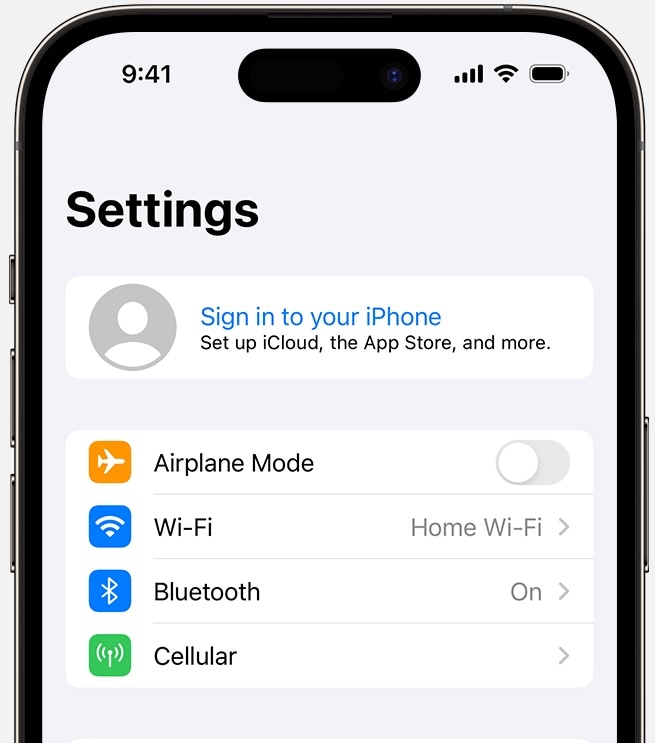
- On macOS: Open SystemPreferences, select Apple ID, and click Sign Out. Sign in again.
Reset Your Apple ID Password
Security concerns related to compromised credentials can contribute to the connection problem. If in doubt, initiate a password reset for your Apple ID. It not only enhances account security but also addresses authentication errors. Here’s how.
Disable VPN
If you use a Virtual Private Network (VPN), consider temporarily disabling it. VPNs can sometimes interfere with the connection to Apple’s servers, causing the error. Disabling the VPN allows you to test whether it’s the source of the problem.
Adjust Date and Time Settings Automatically
Inaccurate date and time settings on your device can lead to authentication failures. Ensure your device’s date and time are accurate and set to update automatically. This prevents synchronization issues with the Apple ID server.

If you’ve tried all the above and you’re still getting the error connecting to the Apple ID server, you may want to consider using Wondershare Dr.Fone - Screen Unlock. It is a powerful tool that can help you bypass the Apple ID lock screen on your Apple iPhone 15, iPad, or iPod touch.
Part 3: A More Comprehensive Solution: Use a Professional Third-Party Software
Wondershare Dr.Fone is renowned for its versatile features. The platform’s Screen Unlock function is designed to address Apple ID-related challenges. What’s more, Dr.Fone is compatible with various iOS versions. It ensures its applicability across a broad range of devices. Its user-friendly interface makes it accessible for both novice and experienced users.

Dr.Fone - Screen Unlock (iOS)
Unlock iPhone/iPad Lock Screen Without Hassle.
- Simple, click-through, process.
- Unlock screen passwords from all iPhone and iPad.
- No tech knowledge required, everybody can handle it.
- Supports the latest iOS version fully!

4,395,217 people have downloaded it
Key Features
- **Comprehensive lock screen removal.**Fone excels in eliminating various lock screens on iOS devices, providing an all-encompassing solution to accessibility challenges.
- **iCloud activation lock and Apple ID bypass.**The software stands out by allowing users to bypass the iCloud activation lock and Apple ID without a password. The feature is particularly useful for users facing login complications.
- **MDM bypass without data loss.**Fone goes beyond standard capabilities by enabling users to bypass Mobile Device Management (MDM) without data loss. This function is crucial for corporate settings or individuals managing multiple devices.
- **Effortless process.**Simplifying the user experience, Dr.Fone offers straightforward steps for the unlocking process.
Step-by-Step Guide on Using Dr.Fone - Screen Unlock
Below are the steps to use Dr.Fone - Screen Unlock.
Step 1: Download and Install Dr.Fone - Screen Unlock on your computer. Launch the app afterward,
Step 2: From the main interface, choose the Screen Unlock option. Next, connect your iOS device to the computer using a USB cable. Click on iCloud Activation Lock Removal to initiate the process.
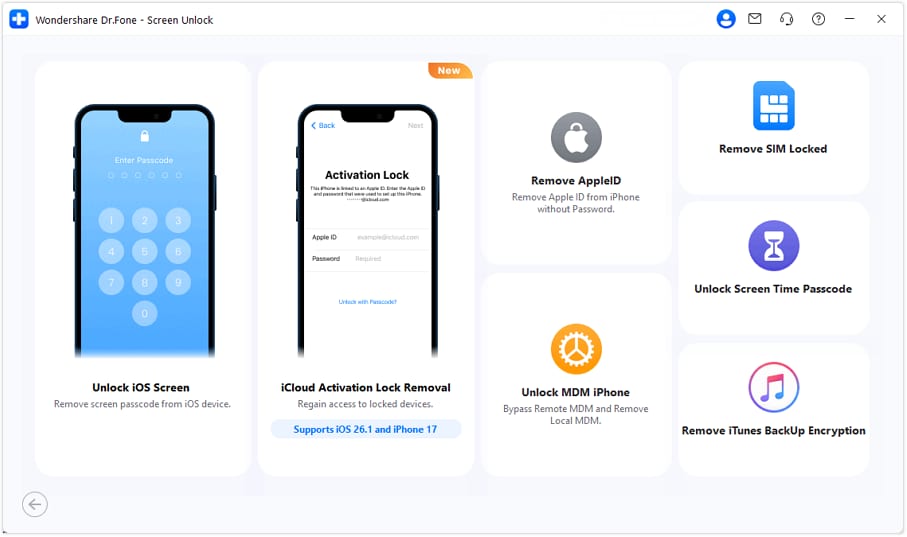
- Step 3: Follow the on-screen instructions and wait for Dr.Fone to detect your device information automatically. From there, the software will provide the necessary firmware package. Click Unlock Now to initiate the process.
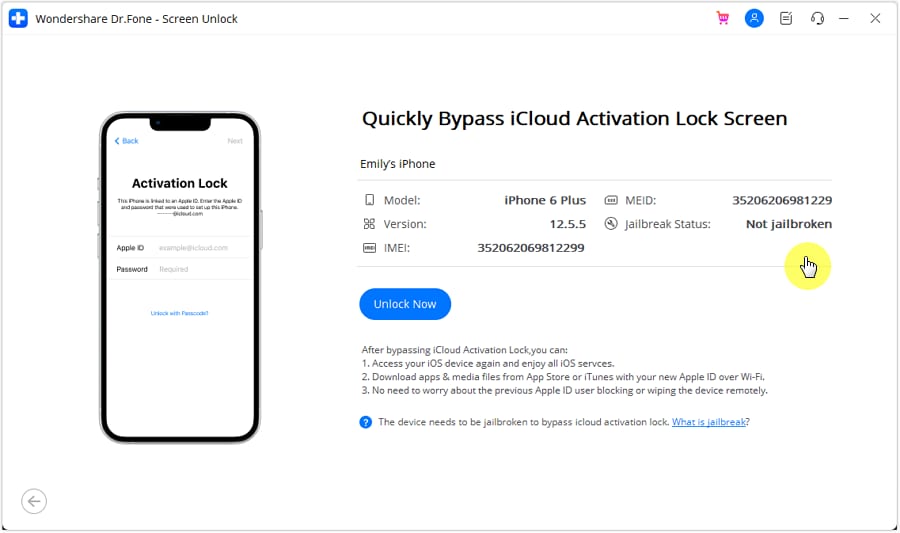
- Step 4: Upon completion of the process, a confirmation message will be displayed on the window. Click the Done button to finalize the unlocking of the Activation Lock.
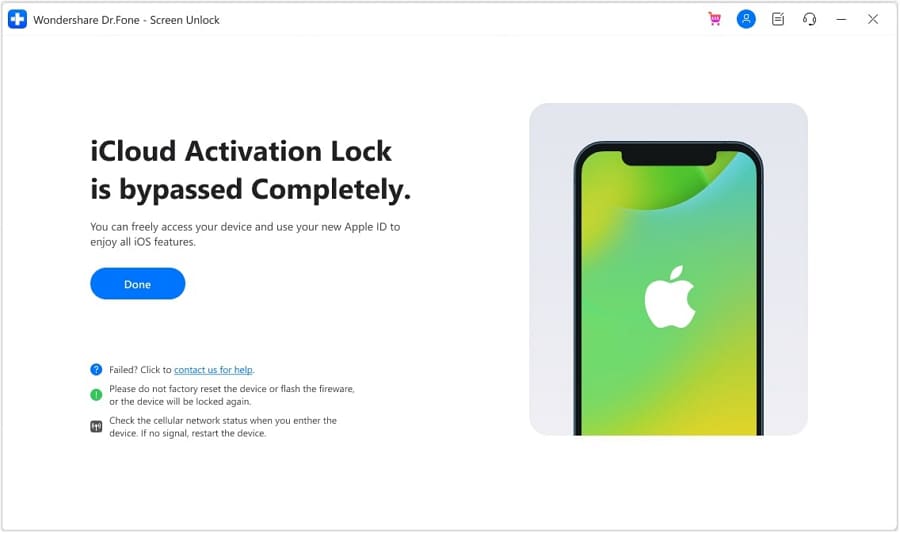
Conclusion
Don’t lose hope if you still can’t connect to the Apple ID server. Take advantage of the provided solutions for a seamless resolution. However, it would help if you also consider the convenience and effectiveness of Dr.Fone - Screen Unlock for a comprehensive fix.
If the Apple ID verification failed error persists, reaching out to Apple Support remains a reliable avenue for additional assistance with your Apple ID connectivity concerns. Your resolution journey begins with these steps, ensuring a swift return to hassle-free Apple services.
Turning Off Two Factor Authentication On Apple iPhone 15? 5 Tips You Must Know
Apple has produced one of the most consumed, acknowledged, and preferred smartphones that allowed them to rule the industry for a considerably long period of time. Their style and presentation were not the only reason that made people look forward to buying an iPhone. Apple created its own operating system and presented their own versions of security and protection. One of the most recognized and impeccable features offered by Apple in its innovative structure was the security and safety through Apple ID and Apple Account. Every important feature that operated throughout the Apple iPhone 15 or iPad was focused over a single entity, the Apple ID. However, apart from the Apple ID, there were several other layers of authentications and verifications that were added throughout the protocol structure. A couple of them are renowned as Two Factor Verification and Two Factor Authentication. This article produces a very generous set of advice that should be looked over while handing these layers of protection. To get a better understanding of the procedures involved, you need to look over the guide to gain better knowledge on how to turn off Two Factor Authentication on your Apple.

Part 1. Is two-step verification the same as two-factor authentication?
There might be a few differences involved in these two security models; however, it should be kept in mind that they focus their purpose on securing the Apple ID of the user. Two Factor Verification is a security protocol that protects access to the various activities performed through the Apple ID. It attenuates an extra verification step across the Apple iPhone 15 device in addition to the password for the Apple ID. The device receives a verification code from an authentication factor that allows the authorities to confirm the credibility of the user.
The Two Factor Authentication is considered as an upgrade to the Two Factor Verification, which was released two years after the Two Factor Verification, in 2015. This authentication method exempted the offline recovery keys and application-specific passcodes. They added a six-digit authentication code onto the original password and produced an offline, time-dependent code that is to be generated through the Settings of the trusted device of the user. This feature was appended into the iOS 9 and OS X El Capitan with a region-specific target.
Part 2. How to turn off two-step verification?
As you are aware of the Two-Step Verification process, it is quite easy and typical in configuring. However, when it comes to turning the settings off, it is also a simple and straightforward procedure that can be easily covered by following the steps provided below.
Step 1: You are required to open the Apple ID Account web page on your browser and sign in with your Apple ID credentials.
Step 2: As you log into the website, access the “Security” section, and tap “Edit” from the options provided on the list.
Step 3: Tap on the “Two-Step Verification” option and turn it off. Confirm to conclude the process. You may be required to select the new security questions and verify the data of birth in the process. As you would be done with it, an email would be received across your connected address for confirmation.
Part 3. How to turn off two-factor authentication? (lower than iOS 10.3)
Two Factor Authentication cannot be turned off in a few cases and accounts for iOS versions greater than 10.3. However, if you have activated Two Factor Authentication across the iOS versions lower than 10.3, you can deactivate the feature through a series of simple steps. The exemption of this security feature across your device leaves it protected only through a password and a few security questions. For turning off the Two Factor Authentication from your Apple device, you need to follow the steps provided as follows:
Step 1: Open your browser and access your Apple ID Account website. Provide the details of your Apple ID and log in.
Step 2: Tap on “Edit” in the “Security” section and turn off the “Two Factor Authentication” option.
Step 3: This would lead you to set new security questions for the Apple ID account, followed by a verification of your date of birth. The successful execution of the process would lead to turning it off.
Part 4. Why can’t you turn off two-factor authentication if you already use it? (iOS 10.3 and later)
For users who have an Apple device with an iOS 10.3 or later version, they cannot turn the Two Factor Authentication off after it is accessed. The latest iOS and macOS included extra layers of security in their features, which led towards a better security foundation and protection of information. Users who have updated their account information can unenroll in two weeks after updating. For this, you are required to simply access the confirmation email that you have received and tap on the link to approach the previous security settings. Thus, it makes it far more than impossible for users to turn their Two Factor Authentication off if they consider it unnecessary for their device. This feature is something that would always remain intact with their device as an extra layer of security. Its absence does leave a chance of illegal access to the Apple iPhone 15 device and an increased risk of a security breach. Since it is directly built across the Apple iPhone 15 device and its settings, this makes it a very hard-to-approach characteristic.
Part 5. How to turn off two-factor authentication by removing Apple ID
Users who are very reluctant to remove the two-factor authentication off their device can consider removing the Apple ID itself for fulfilling the purpose. However, when it comes to executing such tasks, the need for a third-party platform gets evident. Third-party platforms provided dedicated services in providing users with a unique platform of operation with an environment that suits their purpose perfectly. Many platforms provide such impressive services, yet the selection gets quite difficult for a series of reasons. The following pointers explain the reasons to the users over why they should focus on selecting a platform such as Dr. Fone – Screen Unlock (iOS) for this purpose.
- You need to have no excessive knowledge of handling the platform.
- You can cover all the dynamics of unlocking the Apple iPhone 15 device without the use of iTunes.
- The platform provides you with the ability to unlock the passcode of your Apple device with ease.
- It offers you to protect your device from the disabled state.
- Works across all models of iPhone, iPad, and iPod Touch.
- Provides services to the latest version of iOS.
Dr. Fone – Screen Unlock (iOS) makes it easy for the users to control and remove their Apple ID and disable the two-factor authentication across their device. However, when it comes to controlling the platform, it follows a few simple and efficient steps that would guide you in executing the task successfully.
Step 1: Connect your Device and Launch Application
You need to connect your Apple device with the desktop and launch Dr. Fone across the computer. Tap on the “Screen Unlock” tool present on the home window and proceed with the removal of two-factor authentication.

Step 2: Access Appropriate Option
On the next screen that opens, you are required to select “Unlock Apple ID” from the three options. Proceed to your Apple device to take the process further.
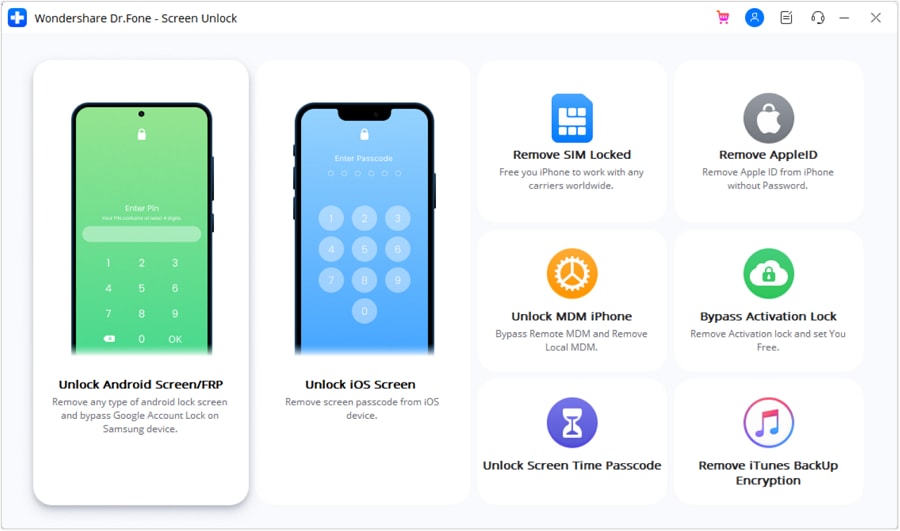
Step 3: Trust the Computer
Open the Apple iPhone 15 device and tap on “Trust” over the prompt that appears on the screen. Following this, you need to navigate to the Settings of your device to initiate a reboot.
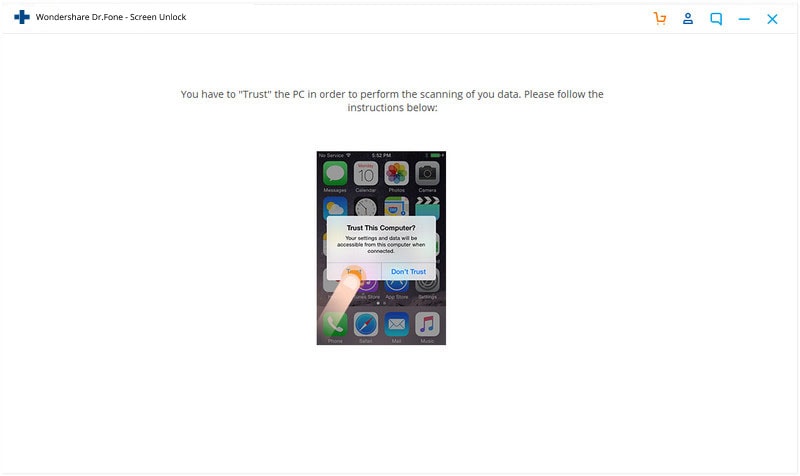
Step 4: Execution of Process
Once you are done with initiating a reboot, the platform automatically detects the update in the process and initiates removing the Apple ID from the Apple iPhone 15 device. Once the platform is done with the process, it provides a prompt message in the next window displaying the execution of the removal of Apple ID from your device. This also removes the Two Factor Authentication off your device.
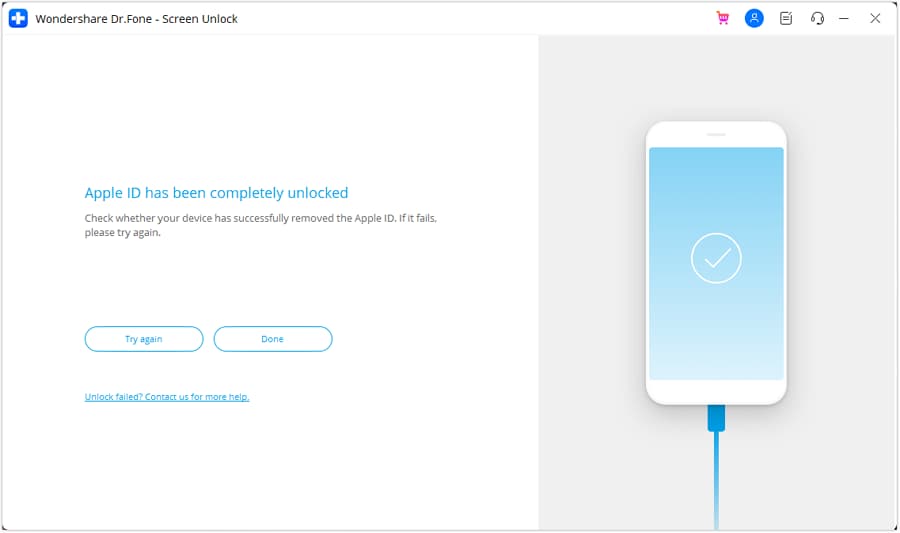
Conclusion
The article has presented a very detailed comparison of the Two Factor Verification and Two Factor Authentication and provided an elaborated discussion over how to turn these security features off their devices. The article also discussed a third-party platform that would guide in removing such security features of the Apple iPhone 15 devices over the requirement of the user. You need to go through this article to get a better knowledge of the execution of the mechanism.
Also read:
- 15 Leading Free Screen Recording Tools: Top Picks for Flawless Screenshots!
- Apple ID Locked or Disabled On iPhone 13 mini? 7 Mehtods You Cant-Miss
- Expedite Tech Advancement How to Embrace macOS 11 Big Sur for 2024
- Fixing Your 'Wrath of the Righteous' Pathfinder Keyboard: A Step-by-Step Tutorial
- Get Ahead of the Curve with Projections for Xbox VR Launch Date, Pricing Schemes & Cutting-Edge Capabilities
- How To Erase an Apple iPhone 11 Pro Max Without Apple ID Password?
- How To Get the Apple ID Verification Code On Apple iPhone 11 Pro in the Best Ways
- How to Sign Out of Apple ID From iPhone 13 without Password?
- How to Turn on Bluetooth on Windows 11/10 [Solved]
- In 2024, For the Tech Sleuth Dissecting the Best Top 10 FB Videos Downloaders
- In 2024, Top-Notch Solutions for Disabled Apple ID On iPhone 6s Plus Making It Possible
- Instagram Acceleration Trendsetting with Likes & Videos for 2024
- Review of the Updated Demon's Souls: Improved Aesthetics and Unchanged Greatness
- Title: In 2024, Top-Notch Solutions for Disabled Apple ID From Apple iPhone 15 Making It Possible
- Author: Alma
- Created at : 2024-10-12 20:39:52
- Updated at : 2024-10-14 21:04:26
- Link: https://apple-account.techidaily.com/in-2024-top-notch-solutions-for-disabled-apple-id-from-apple-iphone-15-making-it-possible-by-drfone-ios/
- License: This work is licensed under CC BY-NC-SA 4.0.
